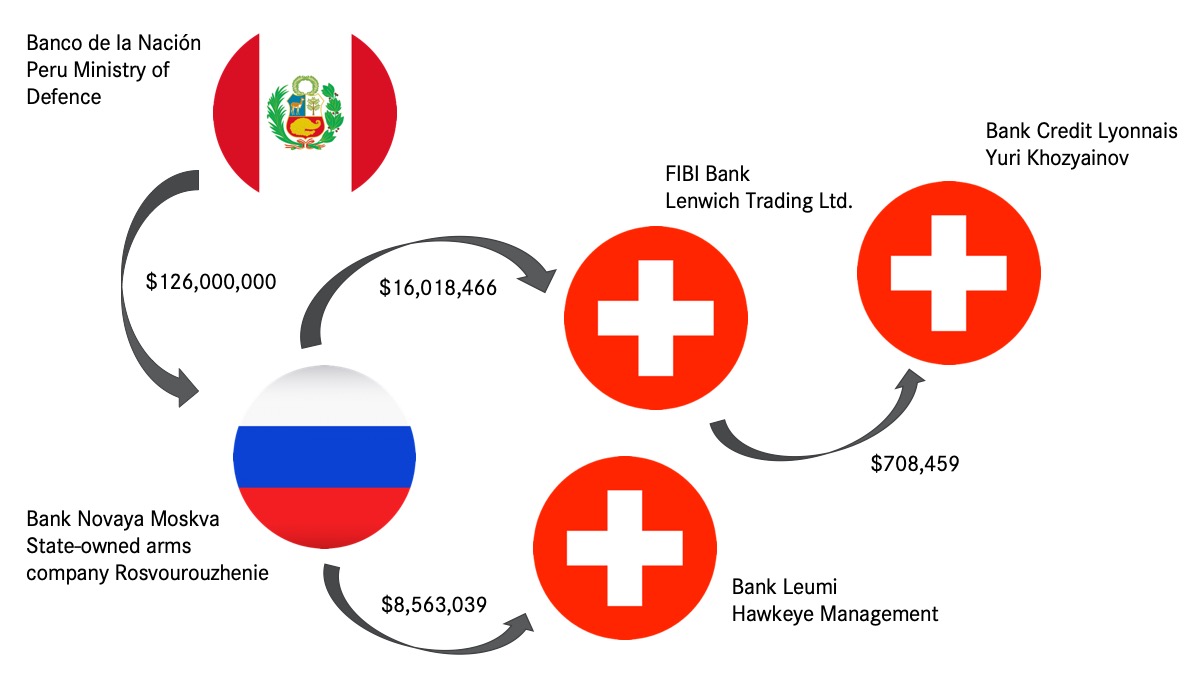The Russian arms dealer case: how Peru recovered stolen assets from a Swiss bank account through non-conviction based confiscation

I recently participated in a panel on the role of non-state actors in the recovery of stolen assets and proceeds of corruption at the 2020 International Anti-Corruption Conference, at which I presented the so-called “Russian arms dealer case”. The case is relatively small in monetary terms – around USD 700,000 plus interest – but hugely significant in terms of asset recovery efforts and international co-operation.
In this case, the Peruvian State used a non-conviction based confiscation technique to recover a bank account frozen in Switzerland. The account contained illicit commissions paid in the context of the purchase of war planes by the Peruvian government during the armed conflict with Ecuador.
This case was the first of a series of cases between Peru and Switzerland applying non-conviction based confiscation techniques. It has paved the way for other proceedings, some of which are still pending in the tribunals.
This case also illustrates one way in which the Basel Institute, through its International Centre for Asset Recovery (ICAR), provides assistance to victim countries in recovering assets stolen through corruption. In addition to this type of technical assistance on specific asset recovery cases, ICAR also delivers capacity building programmes and contributes to states’ efforts to introduce legislative and institutional reforms to facilitate asset recovery.
All of the facts described below are contained in the relevant and publicly available Swiss and Peruvian jurisprudence.
Case study: the Russian arms dealer
Vladimiro Montesinos Torres was the chief of the Peruvian intelligence service and advisor of former Peruvian President Alberto Fujimori (in office from 1990 to 2000). Montesinos headed a criminal organisation through which he systemically distributed bribes to public officials to accumulate influence over vast areas of government, the media and public life in Peru.
Fujimori and Montesinos orchestrated large procurements for the Peruvian state that were tainted with corruption and resulted in massive losses for Peru. Together with their enablers, they stole several US billions of dollars in public assets from Peru.
In 1998, Montesinos and Fujimori instigated the purchase of military aircraft by the Peruvian state. The vendor was a Russian state-owned company by the name of Rosvooruzhenie, whose vice-director was a Russian citizen called Yuri Khozyainov.
Montesinos and his allies received illicit commissions totalling more than USD 16 million in relation to a single procurement contract. These commissions were paid into two Swiss bank accounts at First International Bank of Israel (FIBI) and Bank Leumi in Zurich. This scheme, as well as later acts of money laundering, were detected and subsequently investigated in several jurisdictions, including Peru, Switzerland and Luxembourg.
It was later revealed that Khozyainov was deeply implicated in Montesinos’ money laundering scheme. Of the USD 16 million in illicit commissions, around USD 708,000 were forwarded to an account held by Khozyainov at the bank Credit Lyonnais.
The bank reported Khozyainov's account to the Swiss Financial Intelligence Unit (FIU) and it was subsequently frozen as part of a Swiss money laundering investigation. A few years later, Peru also investigated the case, applying non-conviction based confiscation techniques. It requested and exchanged evidence with Switzerland through the formal channels of mutual legal assistance (MLA).
Khozyainov appealed the seizure of the assets in Switzerland, claiming Peru did not grant him a due process and that the freeze violated the Swiss MLA regulations. In February 2014, the Swiss Federal Court rejected Khozyainov’s appeal and upheld the freezing order (Decision RR.2013.164).
In February 2016, the Peruvian courts ordered the confiscation of Khozyainov's Swiss bank account and, two months later, requested Switzerland to execute the decision and to hand over the assets, including interest.
Switzerland granted MLA and executed the request in June of that year, but Khozyainov appealed to the Swiss Federal Criminal Court. The court rejected his arguments and ordered the return of the frozen assets to Peru (Decision RR.2016.147).
Arguing a further violation of rights of constitutional nature, Khozyainov lodged an appeal at the Swiss Federal Supreme Court, which ultimately ruled that that the Peruvian investigation and trial was fair in all aspects.
The value of early preparatory meetings
Among the many lessons learned in this process was the great importance of preparatory meetings between central and executing authorities.
It is continuously pointed out in international fora that for an asset recovery case to be successful it needs to be closely coordinated between requesting and requested states. We profoundly adhere to this statement.
In practice this means that substantive work needs to be undertaken as a basis for such discussion and coordination. The case examined here has provided Peru and Switzerland with the opportunity to discuss in detail the mechanisms Switzerland will use to recognise and execute the Peruvian decision based on a typology of confiscation which is unknown in the Swiss legal framework. On the other hand, these preliminary meetings allowed the Peruvian authorities to understand the conditions in the Swiss domestic legal framework for the execution of foreign confiscation orders.
Creating precedent-setting jurisprudence
Obviously, the above-mentioned exercise requires innovative thinking and a deep knowledge of both legal systems as well as the languages and legal traditions. ICAR’s specialists, in close coordination with prosecutors of the requesting and requested state, supported these efforts.
The end conclusion was that both legal systems had equivalent provisions for dealing with similar underlying facts. This enabled the Peruvian decision to be admitted in Switzerland for execution.
Financial investigations at the heart of asset recovery
Independently of the underlying legal action that led to the recovery of the illicit assets, Switzerland’s capacity to cooperate in such asset recovery scenarios depends on two main preconditions pertaining to the foreign procedure. First, the respect of due process requirements in the victim state. Second, that the asset is of criminal origin, i.e. is linked to a crime. This is necessary in order to execute the foreign decision through MLA in criminal matters.
It is no simple matter to demonstrate in court that assets – especially when they undergo several transformations in a money laundering scheme – are the proceeds of a crime.
In the course of our work in Latin America, ICAR’s financial investigators and their Peruvian counterparts had been able to establish with a high degree of certainty that the assets in the Swiss accounts originated in the Peruvian treasury. To do this, they needed to analyse a large amount of financial data received by Peru through MLA channels. The financial reports were able to reconstitute the paper trail and were used by the Peruvian prosecutors to satisfactorily support their claim in the domestic courts.
At the same time, the financial investigation showed without a shadow of doubt that the assets result from the corruption offence perpetrated by Montesinos and his associates. This in turn provided the legal argument that the Swiss authorities needed to cooperate in criminal matters, even if the underlying foreign confiscation order did not result from ordinary criminal proceedings but from a non-conviction based confiscation action.



